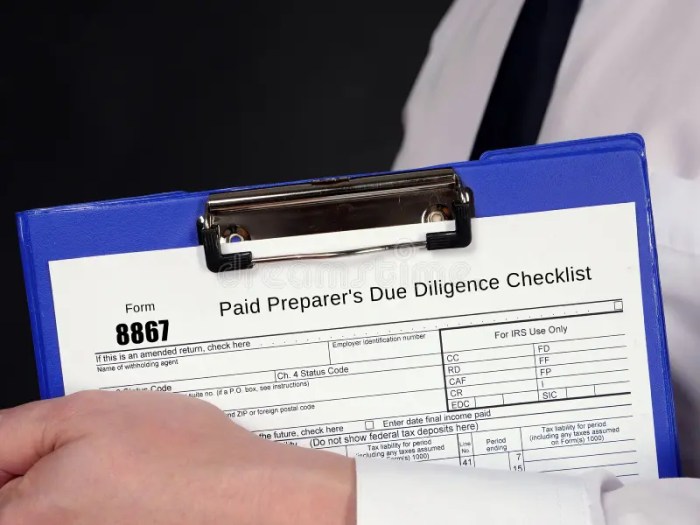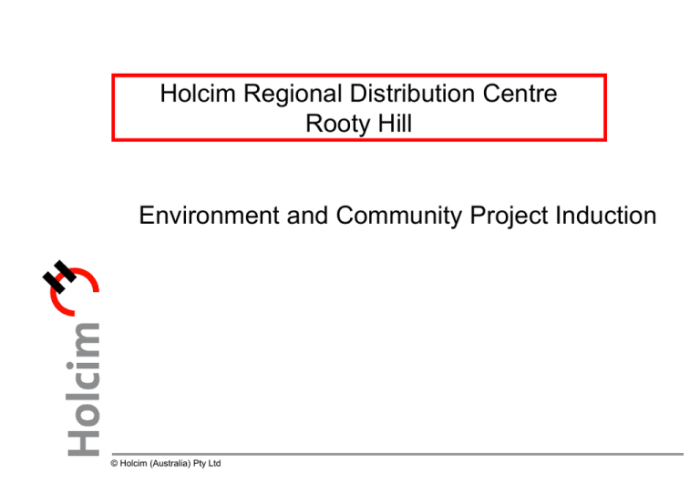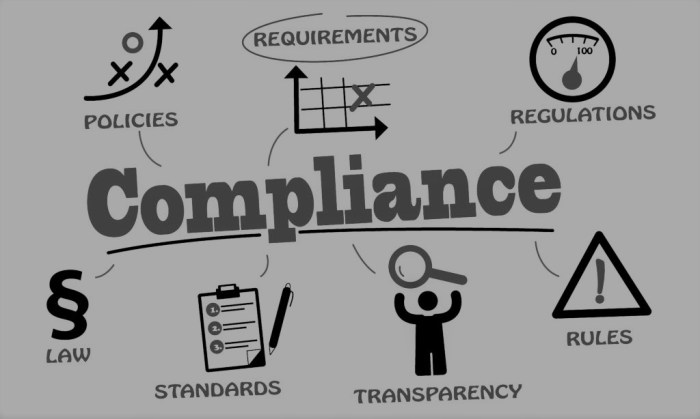Paid preparer due diligence training empowers tax professionals with the knowledge and skills to fulfill their compliance responsibilities and uphold the highest standards of ethical conduct. This comprehensive guide delves into the significance, regulatory requirements, training content, delivery methods, assessment techniques, best practices, and future trends of paid preparer due diligence training.
As the tax landscape evolves, paid preparer due diligence training has become indispensable for ensuring the accuracy and integrity of tax returns. This training equips tax professionals with the necessary tools to identify and mitigate risks, protect client data, and maintain compliance with ever-changing regulations.
Definition and Importance of Paid Preparer Due Diligence Training

Paid preparer due diligence training is a specialized educational program designed to equip tax professionals with the knowledge and skills necessary to fulfill their due diligence responsibilities effectively.
This training is of paramount importance for tax professionals, as it empowers them to meet the increasing regulatory requirements and ethical obligations associated with preparing tax returns for clients.
Objectives of Paid Preparer Due Diligence Training
- Enhance understanding of due diligence requirements for paid tax preparers.
- Develop skills in identifying and mitigating risks associated with tax return preparation.
- Foster awareness of ethical responsibilities and professional standards.
- Promote best practices in client engagement, documentation, and record-keeping.
Regulatory Requirements and Compliance: Paid Preparer Due Diligence Training

Paid preparer due diligence training is subject to a comprehensive regulatory framework that ensures compliance and adherence to professional standards. Tax preparers have a legal obligation to maintain a high level of competence and to exercise due diligence in preparing tax returns for their clients.
The Internal Revenue Service (IRS) has established specific regulations governing paid preparer due diligence training, including:
- Circular 230: Regulations Governing Practice Before the Internal Revenue Service
- Revenue Procedure 2011-15: Standards for Tax Return Preparers
These regulations Artikel the minimum requirements for paid preparer due diligence training, including the content, frequency, and documentation of training.
Compliance Responsibilities of Tax Preparers
Tax preparers have a number of compliance responsibilities related to due diligence training, including:
- Completing the required training hours within the specified time frame.
- Maintaining documentation of their training, including the topics covered, the date of the training, and the provider of the training.
- Applying the knowledge and skills gained from their training to their tax preparation work.
- Staying up-to-date on changes in tax laws and regulations that may impact their clients.
Failure to comply with these compliance responsibilities can result in penalties, including fines, suspension, or disbarment from practicing before the IRS.
Training Content and Objectives

Paid preparer due diligence training focuses on equipping participants with the knowledge and skills necessary to fulfill their responsibilities under the regulatory framework. The core topics covered in the training include:
- Regulatory requirements for paid preparers
- Identifying and verifying taxpayer information
- Due diligence procedures for different types of tax returns
- Common red flags and indicators of potential fraud
- Best practices for documentation and recordkeeping
Learning Objectives, Paid preparer due diligence training
Upon completion of the training, participants should be able to:
- Understand the regulatory requirements applicable to paid preparers
- Apply due diligence procedures to effectively identify and verify taxpayer information
- Distinguish between legitimate and potentially fraudulent tax returns
- Maintain proper documentation and records to support their due diligence efforts
- Stay abreast of evolving regulatory requirements and best practices
Training Delivery Methods
Paid preparer due diligence training can be delivered through various methods, each with its own advantages and disadvantages.
- Online training:Delivered via an online platform, accessible anytime, anywhere with an internet connection. Advantages include convenience, flexibility, and cost-effectiveness. Disadvantages may include lack of personal interaction and potential technical difficulties.
- In-person training:Conducted in a physical location, typically led by an instructor. Advantages include face-to-face interaction, immediate feedback, and networking opportunities. Disadvantages may include limited availability, travel costs, and scheduling conflicts.
- Blended training:Combines online and in-person elements, providing flexibility and personalized learning. Advantages include access to online materials, self-paced learning, and opportunities for in-person interaction and support. Disadvantages may include potential scheduling conflicts and the need for technological proficiency.
The choice of delivery method depends on factors such as budget, audience size, geographic dispersion, and the desired level of interaction and engagement.
Assessment and Evaluation

Measuring the effectiveness of paid preparer due diligence training is crucial for ensuring its impact and making necessary adjustments. Several methods are employed to assess and evaluate training outcomes.
One method involves using pre- and post-training assessments to gauge participants’ knowledge and skills before and after the training. These assessments can include quizzes, exams, or simulations that test their understanding of due diligence concepts and procedures.
Best Practices for Measuring Training Outcomes
- Use a variety of assessment methods to triangulate results.
- Measure both cognitive outcomes (e.g., knowledge, understanding) and behavioral outcomes (e.g., application of skills).
- Collect feedback from participants and instructors to identify areas for improvement.
- Track training outcomes over time to monitor progress and identify trends.
- Use data from assessments and feedback to make informed decisions about future training programs.
Best Practices and Case Studies

Implementing and managing paid preparer due diligence training programs effectively requires adherence to best practices and leveraging successful initiatives. This section explores best practices and presents case studies to enhance the understanding and implementation of these programs.
Best practices for implementing paid preparer due diligence training programs include:
- Regularly update training content:The tax landscape is constantly evolving, so it’s crucial to keep training content up-to-date with the latest regulations, industry best practices, and emerging tax issues.
- Use a variety of training methods:Different learners have different learning styles, so using a variety of training methods can help ensure that everyone understands the material. Some effective methods include instructor-led training, online courses, webinars, and on-the-job training.
- Make training interactive:Interactive training methods, such as role-playing, case studies, and simulations, can help learners apply what they’ve learned to real-world situations.
- Provide ongoing support:After the initial training, it’s important to provide ongoing support to learners. This can include access to online resources, discussion forums, and technical assistance.
Case Studies
The following case studies illustrate the successful implementation of paid preparer due diligence training programs:
Case Study 1:A large tax preparation firm implemented a comprehensive paid preparer due diligence training program that included instructor-led training, online courses, and on-the-job training. The firm also developed a dedicated support team to provide ongoing assistance to learners. As a result of the program, the firm saw a significant reduction in errors and omissions on tax returns.
Case Study 2:A state tax agency partnered with a local university to develop an online paid preparer due diligence training program. The program was designed to be accessible to all paid preparers in the state, regardless of their location or experience level.
The program has been very successful, with over 10,000 paid preparers completing the training since its launch.
Future Trends and Innovations

Paid preparer due diligence training is poised to experience significant transformations driven by technological advancements and emerging trends. These innovations have the potential to reshape training delivery methods, enhance training effectiveness, and improve compliance outcomes.
One key trend is the adoption of artificial intelligence (AI) and machine learning (ML) in training programs. AI-powered chatbots and virtual assistants can provide personalized guidance and support to learners, answering questions and offering real-time feedback. ML algorithms can analyze learner data to identify knowledge gaps and tailor training content accordingly, ensuring a more efficient and targeted learning experience.
Gamification and Immersive Learning
Gamification techniques are increasingly being incorporated into training programs to make learning more engaging and interactive. By incorporating game-like elements such as points, badges, and leaderboards, training can become more motivating and enjoyable, fostering a sense of competition and accomplishment among learners.
Immersive learning technologies, such as virtual reality (VR) and augmented reality (AR), are also gaining traction in paid preparer due diligence training. VR and AR simulations can provide learners with hands-on, experiential training in realistic environments, allowing them to practice and apply their skills in a safe and controlled setting.
FAQ Compilation
What are the key benefits of paid preparer due diligence training?
Paid preparer due diligence training provides numerous benefits, including enhanced compliance with regulations, reduced risk of errors and penalties, improved client satisfaction, and increased professional credibility.
Who is responsible for ensuring that paid preparers receive adequate due diligence training?
Both the tax preparer and the tax preparation firm share the responsibility of ensuring that paid preparers receive adequate due diligence training.
What are the most effective methods for delivering paid preparer due diligence training?
The most effective methods for delivering paid preparer due diligence training include a combination of online learning, in-person workshops, and on-the-job training.